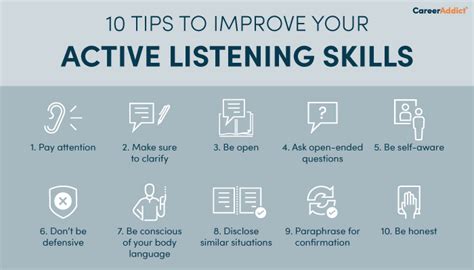How to Enhance Your Listening Skills for Better Learning

Effective learning doesn’t just rely on what you read, write, or observe—it also hinges on how well you can listen. Whether you’re in a classroom, a meeting, or simply engaging with a podcast, your ability to listen actively and attentively plays a crucial role in how well you absorb and retain information. In this article, we’ll explore practical strategies to improve your listening skills for better learning, both in academic settings and in everyday life.
Be Fully Present
The first step to enhancing your listening skills is to be present in the moment. This means eliminating distractions, whether it’s your phone, computer, or external noise. The act of listening requires full attention, so when you're in a learning environment, focus solely on the speaker and the material being shared.
- Actionable Tip: Turn off notifications on your phone or put it in another room during important learning sessions. In meetings or classes, try to sit at the front or where distractions are minimized.
Practice Active Listening
Active listening involves more than just hearing the words; it requires engagement with the content. This means asking questions, making connections, and reflecting on what’s being said. When you actively listen, you’re not passively waiting for your turn to speak; instead, you’re fully engaged in understanding the message.
- Actionable Tip: While listening, nod occasionally, make eye contact, and give verbal cues like “I see” or “Interesting,” to signal that you’re processing the information. Afterward, try to summarize what you’ve learned to reinforce your understanding.
Take Notes, But Don’t Overdo It
Taking notes is a great way to retain information, but it’s essential to strike a balance. If you’re focused too much on writing down every word, you may miss the broader meaning. Instead, aim to capture key points, ideas, and any questions that arise.
- Actionable Tip: Use a note-taking method like the Cornell Method, which helps you organize information into key points, summaries, and questions. This allows you to process the material more effectively while also staying engaged.
Improve Your Concentration and Focus
In today’s digital age, distractions are everywhere. If you want to improve your listening skills, you need to train yourself to focus for longer periods. This requires both mental discipline and physical preparation.
- Actionable Tip: Before listening, take a moment to clear your mind and set an intention for the session. Engage in mindfulness practices like deep breathing or visualization to sharpen your focus.
Learn to Manage Your Internal Dialogue
Our brains are naturally inclined to think ahead, form opinions, or even start preparing a response while someone else is speaking. This internal dialogue can interfere with our ability to truly listen. By managing your internal chatter, you can focus more on the speaker's words and less on your thoughts.
- Actionable Tip: When you notice your mind wandering, gently guide your attention back to the speaker. You can also try repeating key phrases in your mind to stay connected to the message.
Avoid Interrupting and Practice Patience
Interrupting can disrupt the flow of information and makes it harder for you to understand the speaker's full point. Good listeners allow others to finish their thoughts before responding. Additionally, waiting until the end of the conversation allows you to process everything more effectively.
- Actionable Tip: Practice pausing before responding to ensure the speaker has completed their thought. Use the pause to reflect on what you’ve heard and formulate a thoughtful response.
Seek Clarification When Needed
If you don’t understand something, don’t be afraid to ask for clarification. This shows that you are actively engaged and committed to learning. When you listen with the intention to understand, asking questions becomes an important tool for deepening your comprehension.
- Actionable Tip: Don’t hesitate to ask questions like “Could you elaborate on that?” or “Can you provide an example?” These types of questions encourage further discussion and help solidify your understanding.
Practice Listening to Different Types of Content
Just like any skill, listening improves with practice. Try exposing yourself to a variety of speakers, accents, and formats. Listening to podcasts, lectures, interviews, and even audiobooks can diversify your listening experience and make you more adaptable to different learning environments.
- Actionable Tip: Dedicate a few minutes each day to listening to something educational but outside of your usual scope. Whether it’s a podcast on a new topic or a TED Talk on a subject of interest, broadening your range helps build better listening stamina.
Engage in Reflective Listening
Reflective listening involves paraphrasing what you’ve heard to ensure that you’ve understood the message correctly. This not only strengthens your listening skills but also fosters better communication. It shows the speaker that you’re genuinely engaged and clarifies any misunderstandings before they escalate.
- Actionable Tip: After a conversation or lecture, try to summarize the main points back to the speaker or to yourself. For instance, say “So, if I understand correctly, you’re saying that…?” This helps reinforce the content in your mind.
Apply What You’ve Learned
Listening is a means to an end: learning and applying new information. The ultimate test of your listening ability is how well you can incorporate the insights you’ve gained into your daily life, studies, or work. Review your notes, discuss the material with others, or try to apply the new knowledge to real-world situations.
- Actionable Tip: After learning something new, make it a point to use the information in practical ways. Whether it’s solving a problem, starting a new project, or simply discussing what you’ve learned with a friend, application reinforces your listening and learning.